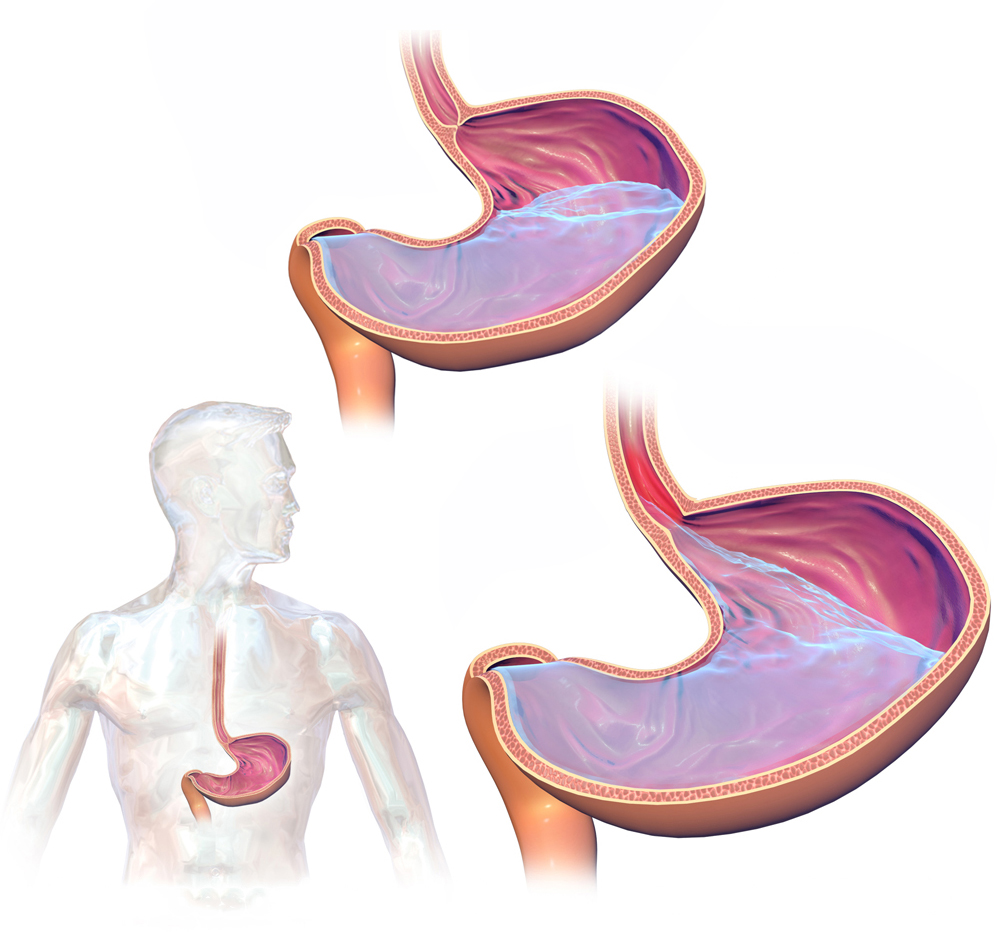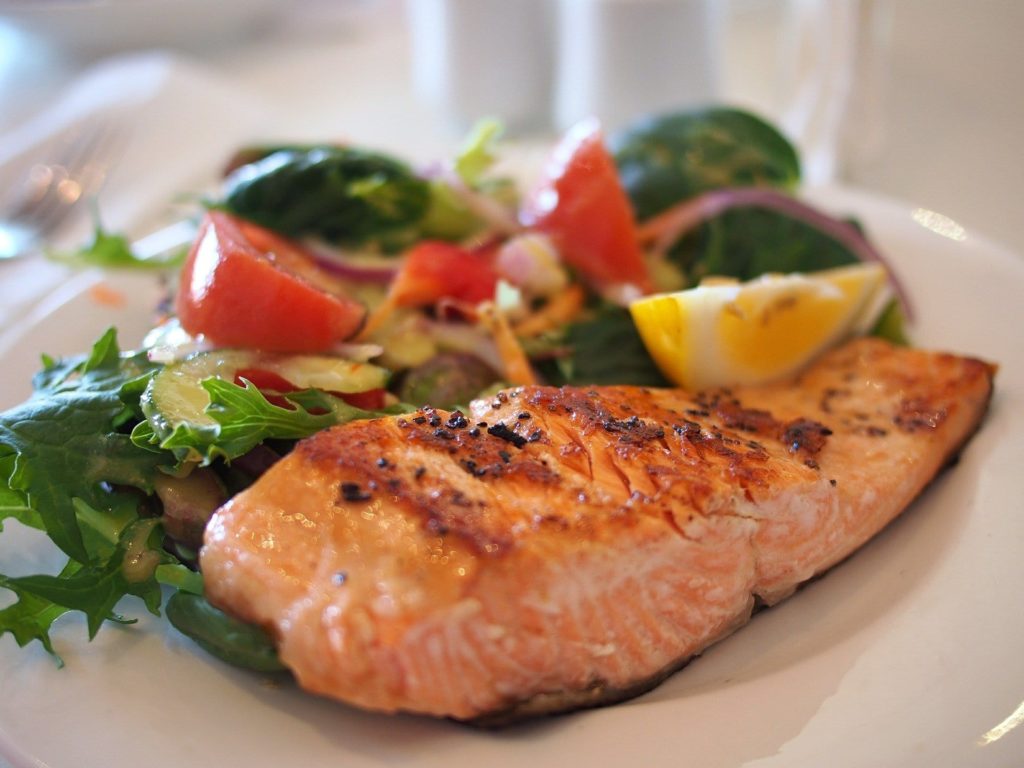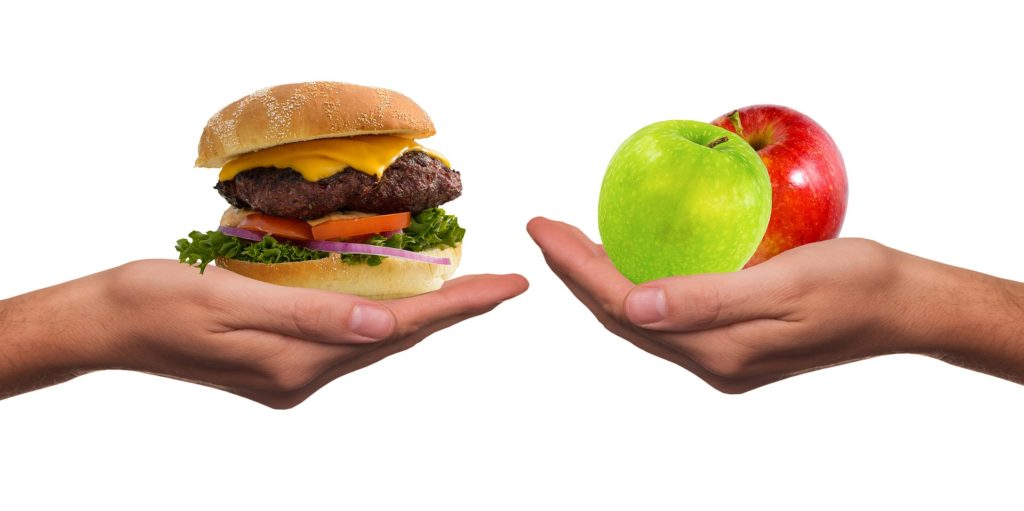Excess stomach acid- Your stomach’s job is to help digest (break down) the food you eat. One way it does this is through stomach acid. The main component of stomach acid is hydrochloric acid. Production of this acid is controlled by hormones and your nervous system. Sometimes your stomach can produce too much acid, which can cause pain and nausea and other symptoms.
Acid reflux (heart burn)- is a common condition that features a burning pain, known as heartburn, in the lower chest area. It happens when stomach acid flows back up into the food pipe (esophagus). Getting a case of acid reflux now and then isn’t unusual, but some people suffer from burning discomfort, bloating and belching almost every time they eat.
GERD- GERD is a chronic condition. The sphincter (valve) between your esophagus and stomach doesn’t work properly, allowing stomach contents to push up out of your stomach into your esophagus. Heartburn is the most common symptom of GERD, but other symptoms include sore throat, hoarseness, chronic coughing, frequent throat clearing, difficult or painful swallowing, unexplained chest pain, bad breath, erosion of enamel on teeth, regurgitation of food or sour liquid, a feeling of a lump in the throat, and an uncomfortable feeling of fullness after meals. Untreated and persistent GERD can also lead to more harmful diseases such as esophagitis, Barrett’s esophagus, and esophageal cancer.
Lack of stomach acid– it’s common to think acid reflux symptoms are caused by an excess of stomach acid, when in fact it may be too little stomach acid to digest food properly. This condition is called hypochlorhydria, and it’s common in individuals over 50, especially women. Lack of stomach acid results in food gets stuck in the stomach longer than normal, causing reflux.
Nighttime “heartburn”- if you frequently experience acid reflux, you’ve probably learned the hard way that symptoms can be worse when you’re trying to sleep. Heartburn can disturb sleep and impact your ability to function well the next day. You may even wake up feeling nauseous.
SIBO- you can have a bacterial overgrowth in your small intestines where it doesn’t belong. This overgrowth produces an abnormal amount of gas, bloating, diarrhea, constipation and other symptoms. If you have a lack of stomach acid, or regular suppression of it over time, can lead to an overgrowth of bacteria.
Thankfully, there are strategies you can employ to reduce the frequency and intensity of acid reflux, as well as minimize the complications that accompany the condition at night. These steps are especially important in helping to avoid damage to the lining of the esophagus that can occur if acid reflux is poorly managed, as well as helping you get better sleep.
Supplements that help manage acid:
- Aloe- ¼ cup of a purified organic aloe gel product, like Lily of the Desert, 3 times 15 minutes before meals, first thing in the morning, or at bedtime. Use the gel form to help coat the stomach. It’s important to get an organic product with minimal sugar, flavoring ingredients, or harmful additives.
- Chamomile- can help reduce your stress levels. It may also help offset the acidity in your stomach. Some studies show that chamomile extracts can lower stomach acidity just as well as some of the commercial antacids.
- DGL- DGL (deglycyrrhizinated licorice) works best when chewed 6-8 times per day at least ½ hour before, or 2 hours after meals. DGL is helpful for GERD, ulcers, and gastritis. Pure Encapsulation.
- DGL Plus- 1 capsule daily, before a meal. Supports the body’s natural defense mechanisms by stimulating the mass, quality, and production of mucous, a major component of the stomach’s protective lining. Contains DGL, aloe, marshmallow, slippery elm. Pure Encapsulation.
- Reflux Relief- adults chew one tablet and allow to dissolve slowly in the mouth. Repeat as needed up to a total of three tablets daily. Combines a blend of herbs and mineral nutrients to help cool occasional heartburn and relieve occasional indigestion. Not to be used during pregnancy or lactation. Contains a botanical blend of Aloe, Chamomile, Marshmallow, Licorice, and Spearmint with mineral nutrients. Gaia Herbs.
- Ginger- Ginger is one of the safest herbs for digestive problems, safe enough that even pregnant women can eat it. Plus, it works just as well if not better then commercial anti-nausea remedies. In smaller, regular doses, ginger is an anti-inflammatory, which can reduce the irritation from acid reflux. Physiologically, ginger may be able to reduce the amount of acid getting to your esophagus because the phenolic compounds help relieve gastrointestinal irritation and reduce gastric contractions. Teas, pills, tinctures, or root.
- L-Glutamine- 1000-3000mg daily in divided doses. Helps reduce inflammation and irritation. The amino acid glutamine aids in maintaining the gut barrier function, mostly by supporting mucus production.
- Enzy-Gest enzymes- 1-2 tablets before each meal. Provides the enzymes and small amounts of stomach acid to breakdown nutrients for absorption into the body. Recommended brand for low stomach acid.
- Gastri-Gest enzymes- 1-2 tablets before each meal. Provides the enzymes to breakdown nutrients for absorption into the body. Recommended brand for digestive support with normal levels of stomach acid.
- Sweetish Bitters Elixir- adults take 60 drops in a small amount of water 15-20 minutes before meals 3 times daily. The use of bitters to help aid healthy digestion has a long history of use in China, India, Europe, and the Americas. Provides digestive support when you occasionally overdo it with food and drink. Shake well before use. Not for use during pregnancy or lactation.
Over the Counter or prescription medications:
- Antacids- Tums and Maalox, neutralize stomach acid
- H2 receptor blockers- cimetidine (Tagamet HB) or famotidine (Pepcid AC), can reduce stomach acid production
- Proton pump inhibitors- omeprazole (Prilosec), block and reduce stomach acid production
Avoid food and drink triggers:
- Acidic foods: caffeine, citrus fruits, tomatoes
- Alcohol: wine, beer, hard alcohol
- Carbonated beverages
- Chocolate
- Fatty and fried foods: saturated fats like cheese, whole milk, sausage, bacon, etc
- Garlic
- Onions
- Peppermint
- Potato chips and other chip snack foods- check the fat content.
Moderation if you aren’t able to, or don’t want to, completely eliminate these foods. Try to avoid eating problem foods late in the evening close to bedtime, so they’re not sitting in your stomach overnight. Avoid heavier meals 3-4 hours before you want to go to bed.
Home remedies that help ease acid reflux in a pinch:
-
Baking soda- dissolve a teaspoon of baking soda into a cup of water and drink. The baking soda helps neutralize acid. Note: contains sodium, avoid if you’re on a low-sodium diet.
-
Xylitol gum- Saliva helps dilute acid, so increasing the amount of saliva you produce after a meal is a great way to help prevent acid production. Try chewing a xylitol gum for 10-15 minutes after a meal.
-
Apple cider vinegar- mix 1 tablespoon of organic apple cider vinegar in 4-6 ounces of water before each meal or bed. You may have to get used to the taste, though Bragg’s brand is fairly tasty.
-
Bananas- a low-acid fruit that can soothe an irritated esophageal lining to decrease discomfort. Due to their high-fiber content, bananas also can help strengthen your digestive system and reduce indigestion. A soluble fiber found in bananas, pectin, helps move stomach contents through your digestive tract in a timely manner.
- High fiber foods- fiber promotes intestinal health and reduces constipation. It makes you feel full a long while after eating it. When you feel full, you are less likely to overeat and therefore less likely to regurgitate what’s in your stomach into your esophagus. Good examples:
- Whole grains such as oatmeal, couscous and brown rice.
- Root vegetables such as sweet potatoes, carrots and beets.
- Green vegetables such as asparagus, broccoli and green beans.
- Milks/Yogurt- lowfat options have a soothing effect that helps coat the stomach and reduce discomfort. Nonfat milk (including nut milks) can act as a temporary buffer between the stomach lining and acidic stomach contents and provide immediate relief of heartburn symptoms. Yogurt contains probiotics, a type of good bacteria that gives a boost to your immune system. Make yogurt even more impactful by adding in a bit of anti-inflammatory ginger. Choose low/no sugar products.
- Alkaline foods- all food and beverages can be measured on the pH scale (an indicator of acid and alkaline levels). Low pH is acidic and more likely to cause reflux. Foods with higher pH are alkaline and can help offset strong stomach acid. Alkaline foods: cauliflower, fennel, leafy greens, melons.
- Watery Foods- Eating foods that contain a lot of water can dilute and weaken stomach acid. For example- brothy soup, celery, cucumbers, herbal teas, lettuce, watermelon.
- Lemon juice- Lemon juice is generally considered very acidic, but a small amount of lemon juice mixed with warm water and raw (or Manuka) honey has an alkalizing effect that neutralizes stomach acid.
Keep track of symptoms
Keeping a food diary and noting when you have symptoms can help you pinpoint what foods might be problematic. This way, you can avoid them or at least eat less of them. You can also keep track of your symptoms if they’re unconnected to foods.
Know your medication side effects
Certain medications may contribute to GERD. Common ones include: anticholinergics, calcium channel blockers, tricyclic antidepressants, nonsteroidal anti-inflammatory drugs (NSAIDs).
Prevention tips
- Sleep with your head elevated. Try a mattress lifter, a wedge-shaped pillow, or an extra pillow to help gravity keep your stomach contents from moving upward.
- Eat smaller more frequent meals. Eat several smaller meals throughout the day rather than two or three large meals. Avoid eating high-calorie, high-fat meals in the evening.
- Chew a lot. Eat meals slowly and chew thoroughly makes food smaller helps digestion.
- Time food and rest right. Wait at least 3 hours after eating before lying down.
- Improve your posture. Stand/sit up straight to stretch your esophagus and give your stomach more room.
- Stop smoking- it irritates the esophagus, the airways, and can cause coughing, which can trigger acid reflux or make it worse.
- Reduce stress- reduces heartburn. Try yoga, tai chi, Qi gong, dancing, meditation, or other healthy ways to improve your mood and reduce stress.
- Avoid clothes that fit too tightly around your waist and put pressure on your middle.
- Take a walk after a meal. A leisurely walk after dinner helps accelerate digestion and reduce the risk of stomach acid seeping up into your esophagus.
- Weight management- being overweight can increase the frequency of acid reflux. This is because extra weight, especially around the abdomen, can put pressure on the stomach and lead to acid spilling up into the esophagus.




